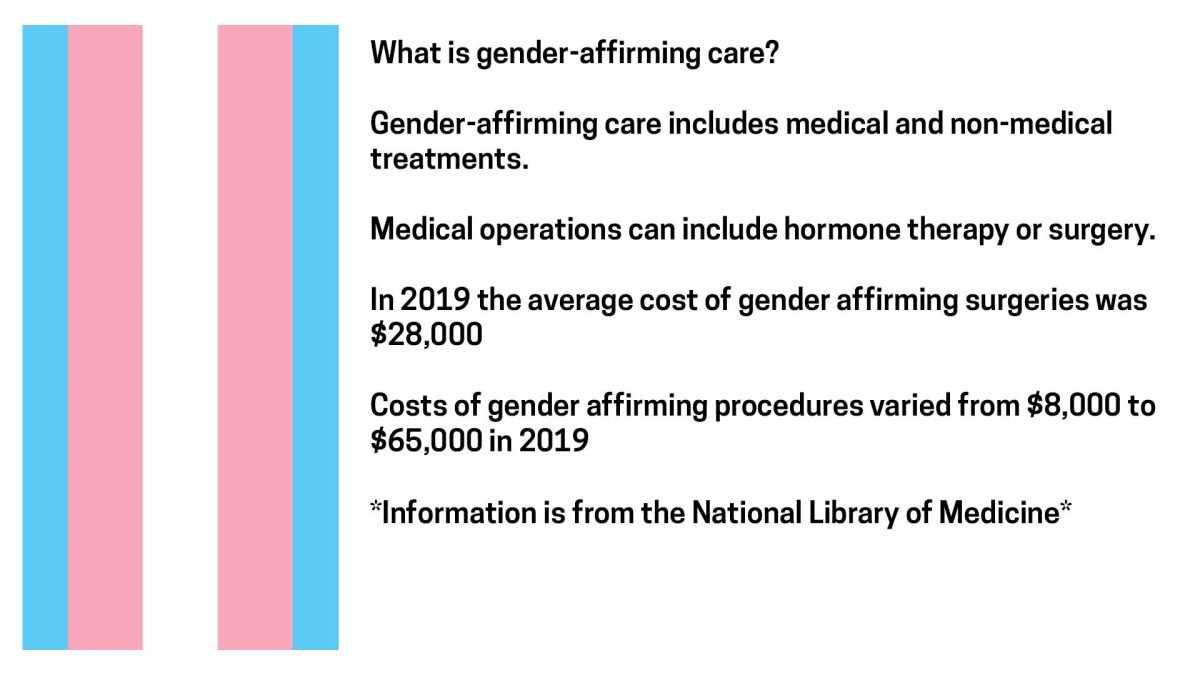“Inside the Capitol” examines key bills from the 89th legislative session that impact the Texas State and San Marcos communities. The session began on Jan. 14 and ends June 2.
People seeking gender-affirming care may see changes to their insurance coverage, or even lose coverage entirely, due to two new bills from Texas’ 89th legislative session.
State Rep. Jeff Leach, R-Plano, introduced House Bill 778 (HB 778), which would require healthcare insurers to cover adverse effects of transition, including procedure reversal. On the opposite end, Senate Bill 115 (SB 115), introduced by State Sen. Bob Hall, R-Edgewood, would prohibit insurers from covering gender-affirming care, including Medicaid.
SB 115 claims “the medical community has a conflict of interest in offering gender modification treatments and procedures because those treatments and procedures create lifelong patients as a result of required follow-up visits after those treatments and procedures.”
Dr. Georgeanne Freeman, owner of Freeman Medical Clinic in Austin, has provided transition services for over 14 years. According to Freeman, transitioning includes different adjustments.
“There are people who don’t even necessarily want hormones as part of their care and then there are people who want hormones to affirm the gender they feel they are, as well as surgeries,” Freeman said. “So there are these two extremes, and then most people are somewhere in the middle, and that can evolve.”
However, SB 115 will not affect Freeman’s practice, as she no longer takes insurance in her clinic due to past unreliable coverage from insurance companies, as well as the amount of time insurance processing requires.
“One year, Blue Cross Blue Shield might cover estrogen, but they wouldn’t cover testosterone. Then the next year, they quit covering hormones altogether. It was always very rare for insurance to cover any surgical procedure for transgender affirmation,” Freeman said.
The National Library of Medicine states most hormones cost under $100 for a 30-day supply, on average.
According to Freeman, HB 778’s proposal for insurers to cover procedure reversal is unwarranted. Freeman said she never encountered a patient who wanted to reverse the gender-affirming care they had received.
According to a survey by The National Center for Transgender Equality, out of 27,715 people who transitioned in 2015, 8% reverted to the gender they were assigned at birth, and over half of that figure had only done so for a short period before transitioning again.
Safara Malone, policy intern for Transgender Education Network of Texas, has seen an increase in policies against transgender people under President Donald Trump’s administration. According to Malone, during the Biden administration, many people were able to get gender-affirming care under Medicaid, Medicare, AETNA and Blue Cross Blue Shield.
Trump signed Executive Order 14187 on Jan. 28, which banned all types of gender-affirming care for individuals under 19. This is similar to Texas SB 14, which banned gender-affirming care for minors under 18 in Texas in September 2023.
“For Texas legislators, this isn’t about protecting the detransitioners and making sure they’re safe and they can get retribution, this is about putting physicians and insurance companies in a difficult position and making them choose between if they’re going to continue protecting and affirming trans people,” Malone said.
Malone believes the main priority for transgender people is to be treated fairly by government agencies.
“I think it’s a matter of just allowing people to have autonomy over their own bodies because, truly, this is not hurting anyone else,” Malone said.
Basil Longoria, communication design sophomore and Bobcat PRIDE’s social chair spoke on what it’s like to be a transgender person in Texas. Though Longoria said he sees support locally, he expressed discontent with the way the government treats trans people at both the federal and state levels.
“The Texas government has shown clear disrespect for transgender people,” Longoria said. “It’s just very clear that the current administration does not care for us and is actively trying to displace us and our communities.”
Longoria began using hormone replacement therapy before SB 18.
“There’s a lot of current trans children who are being affected by this legislation and I think it’s very unfair… Depriving this care from us is going to harm us; it’s going to kill us,” Longoria said. “We’re people. I’m just a student that goes to Texas State…We are always going to exist, no matter what.”
HB 778 has been introduced and will next be read, referred to a committee for discussion and then voted on for presentation to the full House.
SB 115 has been referred to the State Affairs Committee where it will be heard and voted on.
Individuals interested in tracking either bill can do so on its website.


















